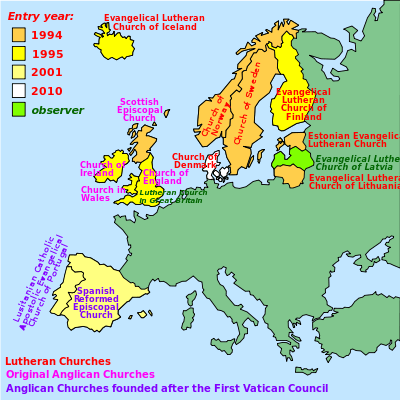Porvoo Communion
The Porvoo Communion is a communion of 15 predominantly northern European, with a couple of far-southwestern European (in the Iberian Peninsula) Anglican and Evangelical Lutheran church bodies. It was established in 1992 by a theological agreement entitled the Porvoo Common Statement which establishes full communion between and among these churches.[1] The agreement was negotiated in the town of Järvenpää in Finland, but the communion's name comes from the nearby city of Porvoo, where a joint Eucharist (or Holy Communion) was celebrated in Porvoo Cathedral after the formal signing in Järvenpää.

In 1938, the Archbishop of Canterbury, symbolic head of the Anglican Communion in London, invited the representatives of the Estonian Evangelical Lutheran Church and Latvian Lutheran Church to the Lambeth Palace in London in order to reach "altar and pulpit fellowship" between the Anglican and Baltic Lutheran churches. This process came to a formal conclusion with the establishment of the much wider Porvoo Communion in 1992. The churches involved are the several Anglican churches of the British Isles (headed by the founding Church of England) and the other Evangelical Lutheran churches of the Northern European countries. Later negotiations brought the small Anglican churches of the Iberian Peninsula (Spain and Portugal) into the agreement. These churches all share episcopal polity of church organization with the three-fold ministry of bishops, priests (or pastors) and deacons within the historical episcopate with apostolic succession (only bishops ordaining clergy or other bishops, priests and deacons). This is based on the original ministry of the early church.
The Porvoo Communion has no central office or overseer. Each member church has a contact person and these form a contact group which meets each year. Two bishops, one Lutheran and the other Anglican, are co-moderators of the contact group, and there are two co-secretaries also drawn from each tradition. Both are members of the Lutheran World Federation and the Anglican Communion.[2] There are also various conferences and meetings organized to discuss issues of concern to the entire Communion.[3]
Participants
Signatories of the Porvoo Communion:[4][5]
- 1994
- The Estonian Evangelical Lutheran Church
- The Evangelical Lutheran Church in Lithuania
- The Church of Norway
- The Scottish Episcopal Church
- The Church of Sweden
- 1995
- The Church of England
- The Evangelical Lutheran Church of Finland
- The Church of Ireland
- The Church of Iceland
- The Church in Wales
- 2001
- The Lusitanian Catholic Apostolic Evangelical Church (Portugal)
- The Spanish Reformed Episcopal Church
- 2010
- The Church of Denmark – The Church of Denmark voted in December 2009 to join the Porvoo Communion as a full member and signed the "Porvoo Common Statement" declaration on October 3, 2010.[6]
- 2014
- Observers
- The Evangelical Lutheran Church of Latvia, since 1994[7]
See also
References
- "The Porvoo Common Statement". porvoocommunion.org.
- "Porvoo communion contacts". porvoocommunion.org. Retrieved 10 May 2014.
- "Interchange". porvoocommunion.org. Retrieved 10 May 2014.
- "Anglican Churches". porvoocommunion.org. The Porvoo Communion. Retrieved 10 May 2014.
- "Lutheran Churches". porvoocommunion.org. The Porvoo Communion. Retrieved 10 May 2014.
- "Søndagens gudstjeneste i Københavns Domkirke dannede rammen om den historiske underskrivning af Porvoo-deklarationen" (Press release). Official press release. Archived from the original on 12 October 2010. Retrieved 3 October 2010.
- "Observer Churches". porvoocommunion.org. The Porvoo Communion. Retrieved 10 May 2014.
Further reading
- Tjørhom, Ola, ed. (2002). Apostolicity and Unity: Essays on the Porvoo Common Statement. Geneva, CH: Wm. B. Eerdmans Publishing. ISBN 978-2-8254-1375-3.